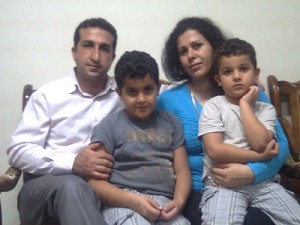A reminder we should not take our freedom to worship (or not) as we choose lightly.
Facing Execution for the 'Crime' of Being a Christian In Iran
Published September 28, 2011 | FoxNews.com
advertisement
In 2010, the Iranian regime carried out 546 executions, more than at any other time during the preceding decade, and representing an increase of around 25 per cent on the previous year. Increasingly, execution is becoming Tehran's favored method for dealing with anyone it deems an opponent -- like Pastor Yousef Nadarkhani, an Iranian pastor who has refused to recant his Christian faith.
Pastor Nadarkhani's case is another grim illustration of the volatile situation faced by religious minorities living under Iran's Islamist clerics. Even though the state formally recognizes the existence of Christians, Jews and Zoroastrians, these minorities are under no illusions about their subordinate status.
Since 2009, when Mahmoud Ahmadinejad stole Iran's election to claim a further term as the country's president, the crime of "moharebeh" -- waging war against God -- has frequently been invoked against those who question the Islamic legal codes which underpin the state.
Pastor Nadarkhani's embrace of Christianity, is a prime example of "moharebeh," and carries the penalty of death. This is despite the fact that Nadarkhani maintains he has never been a Muslim as an adult. But an Islamic court has determined that he has Islamic ancestry and therefore must recant his faith.
It's important to note that the persecution of religious minorities in Iran did not begin with Ahmadinejad.
Ayatollah Khomeini, who led Iran's Islamic revolution in 1979, was clear that abandoning Islam amounts to apostasy.
In 1990, Hossein Soodmand, a Muslim who converted to Christianity in 1960 -- nearly two decades before Khomeini came to power -- was executed. Soodmand's fate proved that the Islamic Republic has no hesitation about acting retroactively in the face of such "crimes."
The only way to escape the death sentence, as Pastor Nadarkhani knows, is to publicly renounce his conversion to Christianity. That he has not done so is a humbling display of his courage, for in Iran, the death sentence is the climax of a long punishment that begins in the jails of the regime.
Recent Congressional testimony by the U.S. Commission on International Religious Freedom detailed the torture and abuse faced by inmates whose offense is simply to adhere to a different faith, or to ascribe to an alternative set of political beliefs.
At a human rights summit in New York last week, Ahmad Batebi, a former Iranian political prisoner, gave a chilling account of his own experiences, which included having his head forced into drain filled with excrement, and being compelled to watch his friends beaten senseless in order to secure his confession.
Thousands of Iranians can offer similar testimony, among them many Christians. A recent shocking case involved Vahik Abrahamian, an Armenian Pastor carrying a Dutch passport who served a year in prison, including 44 days in solitary confinement. Abrahamian's family's spoke of the "severe mental and psychological torture" which he'd faced while in jail.
Arguably, the circumstances of those religious minorities who are not defined as "People of the Book" -- a term denoting those faiths which came before Islam's advent -- is even worse.
Arguably, the circumstances of those religious minorities who are not defined as "People of the Book" -- a term denoting those faiths which came before Islam's advent -- is even worse.
The 300,000 members of the Baha'i faith, whose religious beliefs crystallized in 19th century Persia, are regarded by Iran's rulers as virtually subhuman. Under Iranian law, the blood of a Baha'i is "mobah," which means that Bahai's can be killed with impunity.
When they are not being killed, Bahai's face discrimination with few parallels elsewhere in the world. In May, for example, the regime's security forces arrested and imprisoned hundreds of Bahai's who were involved in a clandestine university that had been launched only because members of their faith are legally proscribed from attending Iranian universities.
When they are not being killed, Bahai's face discrimination with few parallels elsewhere in the world. In May, for example, the regime's security forces arrested and imprisoned hundreds of Bahai's who were involved in a clandestine university that had been launched only because members of their faith are legally proscribed from attending Iranian universities.
Against this bloodstained background, Ahmadinejad again flew to New York last week to address the U.N. General Assembly. His visit sparked fervent demonstrations outside the U.N. building, with many of those present demanding his arrest; as a head of state, however, Ahmadinejad is free to come and go as he pleases.
Ahmadinejad's annual jaunt to the U.N. General Assembly highlights a painful truth: as public awareness of his regime's depravity has reached unprecedented levels, the outside world has remained utterly powerless to rein him in.
"We have very little leverage in Iran," Rev. Keith Roderick, a leading advocate for the civil rights of religious minorities, told me. "Ahmadinejad is at war with the Christian church there, but our influence has diminished."
Rev. Roderick explained that on the cases of individual prisoners, intervention by Vatican or Swiss Embassy representatives in Iran can be helpful. However, the occasional act of mercy by the Iranian authorities does not change the legal or political fundamentals.
Should the Iranian regime should one day decide that it no longer needs to use its religious minorities for political window dressing, the consequences are too painful to imagine.
Ben Cohen is a political analyst and commentator based in New York. He writes frequently on Iranian and Middle Eastern issue. Follow him on Twitter @BenCohenOpinion.
Read more: http://www.foxnews.com/opinion/2011/09/28/facing-execution-for-crime-being-christian-in-iran/print#ixzz1ZL1XHnyq


0 comments:
Post a Comment
Please feel free to comment.
Remember the only censorship done here will be against flamers, bigots, and those who preach hatred. Please avoid political correctness for decency's sake (will not be deleted)!